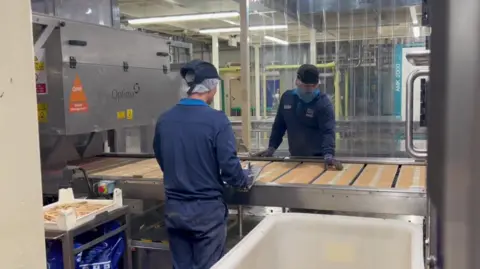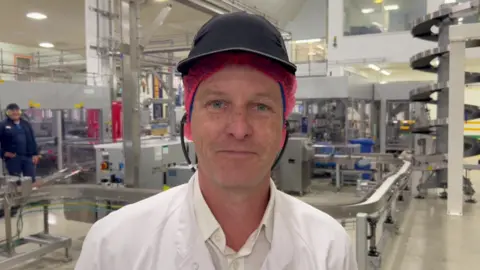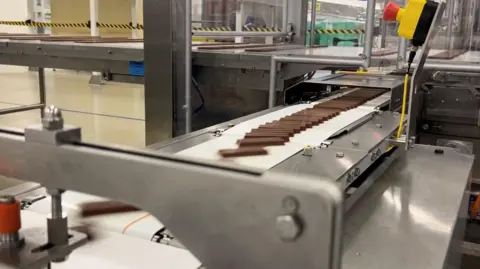SOCIAL HISTORY OF CHOCLATE
By Nathan Turvey, BBC News

BBC/Nathan Turvey
Around 2,000 people work at Nestlé in York
Nestle has committed to keeping production of KitKats in York after upgrading the factory where the famous chocolate bars are made.
The Haxby Road plant was taken over by the Swiss food manufacturer in 1988 and now employs 2,000 people.
More than a billion KitKats are now produced in the city each year on the site of the original Rowntree's factory.
York had a proud history of chocolate-making, with both Rowntree's and Terry's operating large factories in the city in the 19th and 20th centuries.

Around 2,000 people work at Nestlé in York
Nestle has committed to keeping production of KitKats in York after upgrading the factory where the famous chocolate bars are made.
The Haxby Road plant was taken over by the Swiss food manufacturer in 1988 and now employs 2,000 people.
More than a billion KitKats are now produced in the city each year on the site of the original Rowntree's factory.
York had a proud history of chocolate-making, with both Rowntree's and Terry's operating large factories in the city in the 19th and 20th centuries.

BBC/Nathan Turvey
Factory manager Kevin Shrimpton said the machines were now able to operate at a much higher speed
Nestle's factory manager Kevin Shrimpton told BBC Radio York that £22m had been invested in machinery at the plant over the past three years.
Mr Shrimpton said: "We've upgraded the five rapid machines, to allow us to operate at a much higher speed than we were previously."
Some of the York workforce feared for the site's future after Nestle announced in 2022 that it was closing its confectionery factory in Newcastle.
At the time the GMB and Unite unions said 475 jobs would be lost at Fawdon, where Fruit Pastilles were made, and 98 at the York factory.
Nestle instead committed to improving Haxby Road to increase production of KitKats, which were invented in York in 1935.
'Big part of York'
When asked whether Nestlé intended to stay in York, Mr Shrimpton said: "Very much so.
"We employ nearly 2,000 people on the campus, 700 in the factory, so we're a really big part of the York infrastructure.
"York is also the home of the global product technology centre for confectionary, so all the product development we do happens here in York.
"Having the factory right next door is a huge advantage."
Factory manager Kevin Shrimpton said the machines were now able to operate at a much higher speed
Nestle's factory manager Kevin Shrimpton told BBC Radio York that £22m had been invested in machinery at the plant over the past three years.
Mr Shrimpton said: "We've upgraded the five rapid machines, to allow us to operate at a much higher speed than we were previously."
Some of the York workforce feared for the site's future after Nestle announced in 2022 that it was closing its confectionery factory in Newcastle.
At the time the GMB and Unite unions said 475 jobs would be lost at Fawdon, where Fruit Pastilles were made, and 98 at the York factory.
Nestle instead committed to improving Haxby Road to increase production of KitKats, which were invented in York in 1935.
'Big part of York'
When asked whether Nestlé intended to stay in York, Mr Shrimpton said: "Very much so.
"We employ nearly 2,000 people on the campus, 700 in the factory, so we're a really big part of the York infrastructure.
"York is also the home of the global product technology centre for confectionary, so all the product development we do happens here in York.
"Having the factory right next door is a huge advantage."

BBC/Nathan Turvey
Kit Kats have been produced in York since the 1930s
Mark Davies, Managing Director for Nestlé Confectionery UK and Ireland, said about the York site: "It's really vibrant, 2,000 people - there's a lot going on.
"And we just keep putting investment in because you can trust the workers, there's a great workforce in York."
The site also makes chocolate for the production of Quality Street, and uses around 12,000 tonnes of cocoa every year.
The ingredients are sourced responsibly from family farms in Ghana and the Ivory Coast that are part of a Nestle scheme to reduce child labour.
Sweet history
Rowntree's was founded in York in 1862 by a Quaker family. By 1890, the company had acquired the Haxby Road site to expand production.
Between the wars, Rowntree's launched lines such as Aero, Polo mints and Smarties after abandoning attempts to compete with Cadbury's in the milk chocolate market.
After the Nestle takeover in 1988, production of Rolos, Yorkie bars and Easter eggs was moved to York from Norwich, but there were hundreds of job losses at Haxby Road in the 2000s when Smarties manufacture was transferred to Germany.
The York factory remains one of the world's largest confectionery plants.
Rowntree's local rival, Terry's of York, had its 1920s-era Chocolate Works site on Bishopthorpe Road. It was closed by Kraft in 2005, and the buildings have been redeveloped.
Kit Kats have been produced in York since the 1930s
Mark Davies, Managing Director for Nestlé Confectionery UK and Ireland, said about the York site: "It's really vibrant, 2,000 people - there's a lot going on.
"And we just keep putting investment in because you can trust the workers, there's a great workforce in York."
The site also makes chocolate for the production of Quality Street, and uses around 12,000 tonnes of cocoa every year.
The ingredients are sourced responsibly from family farms in Ghana and the Ivory Coast that are part of a Nestle scheme to reduce child labour.
Sweet history
Rowntree's was founded in York in 1862 by a Quaker family. By 1890, the company had acquired the Haxby Road site to expand production.
Between the wars, Rowntree's launched lines such as Aero, Polo mints and Smarties after abandoning attempts to compete with Cadbury's in the milk chocolate market.
After the Nestle takeover in 1988, production of Rolos, Yorkie bars and Easter eggs was moved to York from Norwich, but there were hundreds of job losses at Haxby Road in the 2000s when Smarties manufacture was transferred to Germany.
The York factory remains one of the world's largest confectionery plants.
Rowntree's local rival, Terry's of York, had its 1920s-era Chocolate Works site on Bishopthorpe Road. It was closed by Kraft in 2005, and the buildings have been redeveloped.
No comments:
Post a Comment